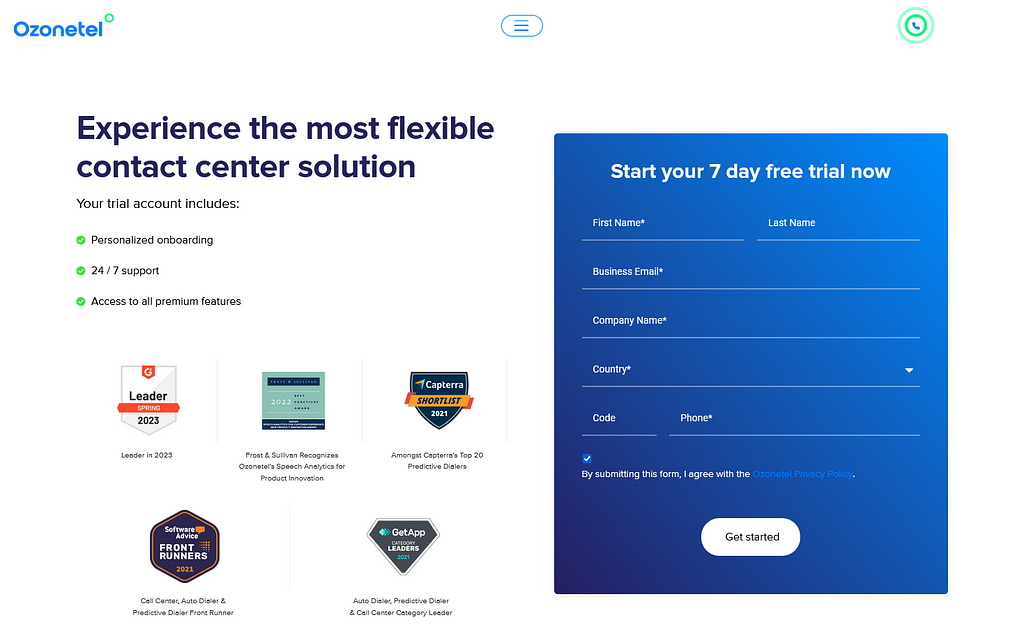- Resources
- How to Humanize Fintech Support in ChatGpt Era? Insights From RazorPay, KreditBee, and PayU
How to Humanize Fintech Support in ChatGpt Era? Insights From RazorPay, KreditBee, and PayU

ChatGPT is transforming the fintech world, breaking frontiers and opening up limitless possibilities. However, as with every tool of such power and potential, finding the sweet spot in its application is paramount. When successfully implemented, it promises to revolutionize customer experiences. It makes them faster, smarter, and more consistent. However, it is essential to ensure that personalized human interaction isn’t lost in the mix.
But how do we go about achieving this balance? Several industry leaders recently gathered for a webinar to discussion these concerns and shed light on some real-world strategies. The panelists included:
- Sudhanshu Mishra – Vice President of Business Development, Ozonetel
- Anjuum Khanna – Senior Director Customer Success, Razorpay
- Samriddhi Sengupta – AVP – KreditBee
- Mike Akeroyd – VP of Upstox
- Nikita Dutt Sharma – Head of Consumer Tech Partnerships, PayU
- Mazin Abdullah – Head of CO Lending and Fund Raise
During the webinar, the panelists explored the pivotal role of human touch in the ChatGPT era. Experts highlighted the need to strike a balance between automation and human interaction for optimal customer experience. They emphasized how they can personalize content with AI and leverage this technology for ensuring omnichannel consistency. They stressed upon user education, transparency and proactive communication strategies. They also spoke about investing in agent training to adapt to evolving roles for fintech success in the AI era. Here, we discuss each of these insights, in detail.
In this article, we will explore:
- 1. Balance automation and human touch for optimal CX
- 2. Personalize content with AI while ensuring accuracy
- 3. Leverage AI for omnichannel consistency
- 4. Prioritize user education and transparency
- 5. Tap AI for personalization at scale
- 6. Adopt proactive communication strategies
- 7. Invest in agent training as roles evolve
Balance automation and human touch for optimal CX
First, let’s agree that AI tools like ChatGPT have powerful capabilities. They are known to streamline processes and deliver faster service. However, oversight by human agents is still crucial, especially when handling complex customer issues. As Nikita put it, “humans take chances” in grey areas where machine logic is binary. The goal for fintechs should be to find the optimal balance between automation and human interaction.
While AI chatbots can provide an efficient “first line of defense” for simple queries, they lack human empathy. The nuance is needed when navigating tricky situations. Anjuum commented, when talking about onboarding: “Do we need a warm body to do this? I would rather need my warm body to do something beneficial for the organization.”
At the same time, AI is nowhere near perfect. Human supervision is still required to prevent basic errors that AI might overlook. Mr. Mavin Abdullah, give an example around sensitive issue of bias in AI technology: “I think the biggest problem is that it is possible that some people of a certain race, people who live in a certain neighborhood, people with a certain background have defaulted on a loan more in the past than the others right now. Unfortunately, AI will take that data or ML will take the data and reject people who come from a similar race or a similar background or a similar community or a similar neighborhood.”
Maintaining human oversight is key to delivering satisfactory resolutions, reducing bias and preventing sensitive errors. At the same time, AI augmentation enables agents to focus their time on higher-value activities. The future will be about coexisting.
Personalize content with AI while ensuring accuracy
The panel explored how AI tools like can help fintechs personalize content at scale. As Mike noted, this technology enables the creation of customized responses tailored to each customer’s needs and preferences. However, the speakers cautioned that proper governance is crucial when leveraging AI to generate personalized content.
AI chatbots can sometimes make blatantly incorrect statements. That is problematic, especially when producing content at scale. To mitigate risks, fintechs need experts to review and validate the accuracy of AI-generated content before implementation. Proper data hygiene, including cleaning and tagging data, is also critical to training accurate models.
With the right human validation, AI personalization can provide customers with contextualized, customized interactions. Without it, any factual inaccuracies could negatively impact portfolios and erode trust in the brand.
“You need to have people that are experts in this cleaning the data categorizing it tagging it and of course validating the accuracy of the results” says Mike.
Leverage AI for omnichannel consistency
According to the panelists, one of the major opportunities for AI is helping fintechs maintain consistent branding, tone, and messaging across the growing array of customer touchpoints. As Sudhanshu explained, today’s customers engage across the web, mobile apps, social media, online chat, and more.
“They should be able to transition seamlessly between different channels without losing context or having to repeat information. One of the most irritating things when interacting with the contact center person is that you have to repeat your whole story again and again if the person changes or if you make a second call. Well, organizations where you don’t have to do that automatically give you a much better experience,” he said.
AI tools can analyze past conversations and interactions to learn a fintech’s “voice” across channels. Then, AI can help ensure future communications adhere to that voice, regardless of channel. This creates a steady, familiar customer experience.
Prioritize user education and transparency
User education and transparency are crucial priorities for responsible AI adoption. “Providing clear explanations and options for users to seek human assistance when they need can help build trust and ensure responsible use of such tools”
As Mike cautioned, headlines about AI
Sudhanshu further suggests that transparency regarding data use also fosters trust. Making sure users aren’t overly reliant on AI is important. Allowing customers to opt into/out of certain AI services gives them a sense of autonomy.
Tap AI for personalization at scale
We must also highlight the potential for AI tools to help fintechs unlock value from their extensive customer data. With proper governance, AI can analyze large volumes of collected data to build 360-degree customer profiles. This can power personalization without you having to proactively share data and documents with the service provider.
Instead of relying on users to provide lots of information, fintechs can apply AI to extract insights from existing data. This includes analyzing behaviors, preferences, and patterns to understand customers on an individual level. These rich insights can then inform personalized product recommendations, pricing, portfolio allocations, and more. Mavin gave examples like suggesting tailored investment portfolios or pre-approving loans based on customer data.
In summary, AI enables fintechs to tap into their vast troves of customer data to deliver personalized services at scale. With the right data governance, AI can crunch insights to offer customized recommendations and pricing without customers having to actively provide excessive information. This creates a smoother, more tailored experience.
A quote from Mavin explains this perfectly;
“Rather than waiting for a customer to come and enter all his details right, I can rely on the data of the customer that I already have and offer him a personalized portfolio right.”
Adopt proactive communication strategies
The panelists strongly encouraged fintechs to adopt proactive communication strategies centered around educating and informing customers. They advocated for proactive outreach on account updates, upcoming payments, suspicious activities, educational content, and more.
Note that transaction speed has increased dramatically, but issue resolution times lag behind. For fintechs to get ahead of problems, they must identify and communicate expected resolutions proactively via channels like email, SMS, and WhatsApp. WhatsApp is especially effective for status updates, even if it is more costly. Being proactive sets proper expectations and enhances perceived support quality.
Invest in agent training as roles evolve
Finally, the panel unanimously agreed that AI advancement will fundamentally evolve agents’ roles and skills needs. With AI handling routine queries, agents will shift focus to delivering personalized, human-centric experiences. As Nikita points out, “There are going to be many situations where you know ChatGPT can solve 80% or 90% of human problems. But still, there will be certain aspects where we will involve both the human touch and AI tool. It will help problem solving and cut down a lot of cost expenses and KYCs for that matter.”
Agents must master the new knowledge management systems so that they can access information faster, resolve problems better, and personalize conversations.
To make this transition successful, fintechs need to invest heavily in retraining agents on AI tools and soft skills like empathy. Training in handling ambiguous, complex situations also remains critical.
In conclusion
As we wrap up, it’s clear from our webinar insights that the integration of AI tools like ChatGPT in the fintech space offers a promising path forward. But first, we must find the right equilibrium between automation and human interaction. Then, we can optimize both efficiency and customer satisfaction.
The most important takeaway lies in embracing these advancements but doing so responsibly.
Ozonetel has also enabled its contact centres with Open AI’s ChatGPT and other generative AI tools. By investing in secure, dependable omnichannel CX platform like Ozonetel, fintech companies can automate service requests & queries at scale and provide customers accurate, contextual and human-like conversations. Want to see what Ozonetel can do for your company? Sign up today for a free 21-day trial.
YouTube Link: Ensuring the ‘Human Touch’ in the ChatGPT Era: A Look at the Fintech Support Ecosystem
Ready to see what Ozonetel can do for your company? Sign up today for a free 21-day trial.
Rakesh Kr Jha
Rakesh, a senior writer at Ozonetel, draws on his decade-long journalism career to write about techn...







